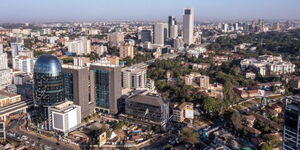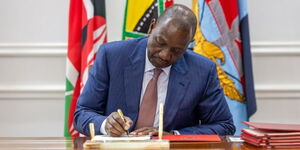An opinion survey by Infotrak Research released on Wednesday, March 31, showed that the Mt Kenya region is heavily opposed to President Uhuru Kenyatta's multi-billion projects.
The Central region topped the list with 69 percent, followed by Coast with 67 percent, Rift valley 66 percent, Nairobi 62 percent, and the Western region garnered 60 percent.
Nyanza was most enthusiastic about the projects, with a minority of 43 percent indicating that the debt was handled poorly.
According to the survey, a majority of 52 percent believe that the projects launched by Uhuru's government are unsustainable leading to heavy debt incurred within the country.
Some of the projects highlighted include: the Nairobi Expressway, Standard Gauge Railway (SGR) project, proposed Lamu coal-powered plant and multiple construction projects by China Road and Bridge Corporation such as the Ksh17 billion Nairobi-Western Bypass project.
The country's public debt as of June 2020 stood at Ksh7.06 trillion, according to the 2021 Budget Policy Statement- a worrying trend in the country that may firmly put the public debt to GDP ratio on a downward spiral.
Out of 800 respondents, 62 percent are of the notion that regular borrowing from foreign countries is not a good thing while 52 percent termed the government's handling of foreign debt as poor.
"A majority of Kenyans in the regions of Western Coast, Central, Nairobi and Eastern rate the government's handling of debt as poorly," read part of the statement released by Infotrak.
The survey also revealed three major concerns by Kenyans about the level of foreign debt within the country. 38 percent perceived that future generations would have to repay the debt for a long time.
34 percent of the respondents expressed concerns that Kenya would default on its repayments which would be a national embarrassment while 24 percent of the respondents noted that should the country default, it would lose its resources and facilities to foreigners.
The debt crisis within the country has been a point of discussion among many Kenyans as some have pointed out the worrying trend in which the government borrows funds for infrastructural projects.
Treasury Cabinet Secretary Ukur Yatani, in previous press briefings, assured Kenyans that the debt level is sustainable.











